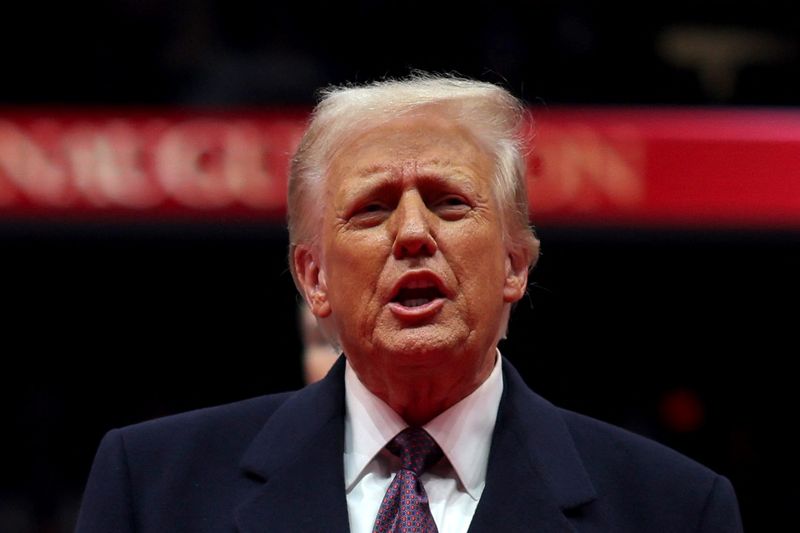By Adwitiya Srivastava and Himanshi Akhand
(Reuters) - Investors scaled back bearish bets on most Asian currencies after U.S. President Donald Trump's inaugural policies suggested he would negotiate rather than immediately impose hefty tariffs on trading partners, a Reuters poll showed on Thursday.
Short bets on the Chinese yuan, the Taiwanese dollar and the Thai baht were lower than a fortnight ago, according to a poll of 11 respondents.
Short positions on the South Korean won - the best performing Asian currency so far in January - were also lower.
Many investors expected tariffs to be among a raft of executive orders Trump signed in his first day in office. However, signs of a measured approach weakened the dollar and bolstered risk sentiment towards Asian currencies.
Trump said his administration was discussing imposing a 10% tariff on goods imported from China and around 25% levies on Mexico and Canada from Feb. 1.
"As long as market players remain convinced that the Trump 2.0 government will not quickly implement the tariff hike and the magnitude of the tariff hike won't be as severe as previously concerned, we could see Asian FX being supported by such views and somewhat weaker U.S. dollar as well as muted/lowered movement in the UST-10y yield," said Poon Panichpibool, a markets strategist at Krung Thai Bank.
Short bets on the Singapore dollar also eased. Lower inflation and higher growth have created room for the Monetary Authority of Singapore to ease policy settings at its review on Friday, though analysts are split on whether the central bank would wait to assess the impact of Trump's policies.
Bucking the trend, short bets on the Indian rupee rose to their highest since mid-July 2022.
The rupee has declined about 3% since Trump won the U.S. election and is the second-worst performer among regional peers this month.
"INR overvaluation, a growing RBI forward book, and broad USD strength remain factors likely to push the INR weaker," Barclays (LON:BARC) analysts said in a note, adding that foreign outflows in the equity market have also weighed on the rupee at a time when forex reserves have been falling.
Bearish bets on the Indonesia rupiah also rose to their highest since November 2022.
Last week, the Bank of Indonesia (BI) surprised markets with an unexpected rate cut to boost economic growth.
Barclays analysts said that the rupiah was losing its policy rate anchor.
"The shift in BI's stance towards a more dovish-leaning, pro-growth stance should open up further upside for USDIDR."
The Asian currency positioning poll is focused on what analysts and fund managers believe are the current market positions in nine Asian emerging market currencies: the Chinese yuan, South Korean won, Singapore dollar, Indonesian rupiah, Taiwan dollar, Indian rupee, Philippine peso, Malaysian ringgit and the Thai baht.
The poll uses estimates of net long or short positions on a scale of minus 3 to plus 3. A score of plus 3 indicates the market is significantly long U.S. dollars.
The figures include positions held through non-deliverable forwards (NDFs).
The survey findings are provided below (positions in U.S. dollar versus each currency):
DATE USD/CNY USD/KRW USD/SGD USD/IDR USD/TWD USD/INR USD/MYR USD/PHP USD/THB
23-Jan-25 1.33 1.04 1.11 1.50 1.01 1.78 1.01 0.77 0.54
09-Jan-25 1.65 1.75 1.34 1.20 1.18 1.69 0.99 0.65 0.76
12-Dec-24 1.15 1.86 0.83 0.87 0.82 1.43 0.65 0.53 0.26
28-Nov-24 1.32 1.45 1.12 1.03 1.10 1.13 0.76 1.13 0.66
14-Nov-24 1.14 1.61 0.80 0.81 1.07 0.87 0.65 1.18 0.90
31-Oct-24 0.30 1.06 -0.03 0.59 0.60 0.82 0.11 0.81 0.09
17-Oct-24 -0.43 0.26 -0.44 0.04 0.24 0.67 -0.40 0.26 -0.28
03-Oct-24 -1.14 -0.79 -1.26 -1.08 -0.59 -0.04 -1.18 -0.70 -1.45

19-Sep-24 -0.67 -0.90 -1.12 -1.18 -0.66 0.33 -1.30 -1.10 -1.33
05-Sep-24 -0.85 -1.09 -1.26 -1.05 -0.77 0.21 -1.46 -1.00 -1.22